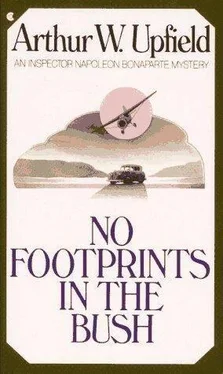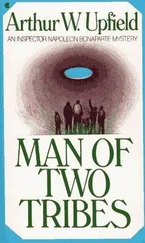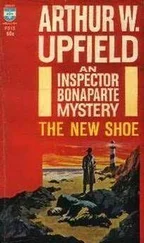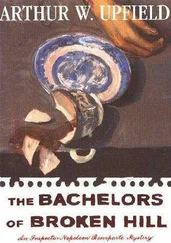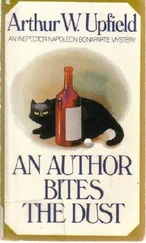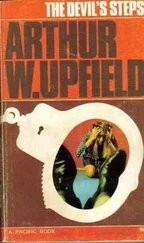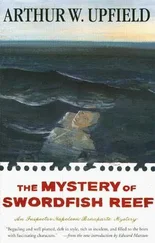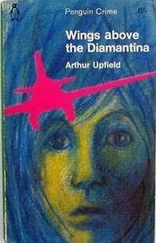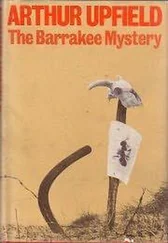Arthur Upfield - No footprints in the bush
Здесь есть возможность читать онлайн «Arthur Upfield - No footprints in the bush» весь текст электронной книги совершенно бесплатно (целиком полную версию без сокращений). В некоторых случаях можно слушать аудио, скачать через торрент в формате fb2 и присутствует краткое содержание. Жанр: Классический детектив, на английском языке. Описание произведения, (предисловие) а так же отзывы посетителей доступны на портале библиотеки ЛибКат.
- Название:No footprints in the bush
- Автор:
- Жанр:
- Год:неизвестен
- ISBN:нет данных
- Рейтинг книги:5 / 5. Голосов: 1
-
Избранное:Добавить в избранное
- Отзывы:
-
Ваша оценка:
- 100
- 1
- 2
- 3
- 4
- 5
No footprints in the bush: краткое содержание, описание и аннотация
Предлагаем к чтению аннотацию, описание, краткое содержание или предисловие (зависит от того, что написал сам автор книги «No footprints in the bush»). Если вы не нашли необходимую информацию о книге — напишите в комментариях, мы постараемся отыскать её.
No footprints in the bush — читать онлайн бесплатно полную книгу (весь текст) целиком
Ниже представлен текст книги, разбитый по страницам. Система сохранения места последней прочитанной страницы, позволяет с удобством читать онлайн бесплатно книгу «No footprints in the bush», без необходимости каждый раз заново искать на чём Вы остановились. Поставьте закладку, и сможете в любой момент перейти на страницу, на которой закончили чтение.
Интервал:
Закладка:
In the eastward wall was a door, and beyond this part of the wall a line of graceful sugar gums bore aloft jade bracelets to catch the rays of the brilliant sun.
A famous English novelist wrote a story about a door in a wall beyond which lay-And through this door in a wall of cane-grass Bonaparte passed to enter-a shrine. It was all a shrine, a place of quiet beauty, for cemetery, which hints at cement and coldness, is not the right word for this place of the sleepers.
The shrine was square-shaped and walled with cane-grass, and in extent was approximately half an acre. In the centre was a white marble fountain-a woman holding aloft the torch of truth from which a thin column of water rose and plumed into spray which descended into the shell-like basin. The entire floor of this place was a lawn in which small circular beds of roses seemed like incense bowls. Against the north walllay two massive slabs of red granite: three similar slabs were over against the south wall. And over all, roses and grass, fountain and red granite slabs, danced the shadows of the sugar-gum leaves.
Bony slowly passed to the twin slabs of red granite where he read the names chiselled deep and wide. Angus McPherson appeared on the one, and Flora McPherson appeared on the other. There were no dates and no epitaphs.
A little awed, conscious of standing on hallowed ground, Bonaparte turned to skirt the fountain and to stand before the three slabs resting side by side. Names were chiselled on all three, but those on the outside had been obliterated with cement which easily could be removed when the vault beneath had received its casket. The name on the centre one contained but the one word-Tarlalin-pronounced by McPherson, “Tar-lay-lin.”
Tarlalin! The name itself was poetry. Tarlalin! An Australian aborigine was lying beneath that magnificent slab of red granite brought all the way from Scotland. Tarlalin!
The bodies of Australian aborigines had rotted to dry dust in the hot sands of the deserts: had slowly perished in creeks and waterholes: had swelled with the effect of the white man’s poison: and festered with the effects of the white man’s bullets. They had been flogged at Sydney, hanged at Brisbane, loaded with chains at Adelaide and at Perth: had sunk into theferntree gullies of Tasmania. The aborigines had been debased, outraged, jibed at and made the butt of both coarse and refined wit. They had been drawn into the shadow of a civilization which, compared with theirs, was a riot of criminal lunacy. And here in this beautiful shrine one man of all the thousands who had sinned consciously and unconsciously against a race had made atonement when reverently he had laid to rest one aboriginal woman in a mausoleum of imperishable granite, protected from the withering wind by the wall, from the hot sun by the branches of the sugar gums, perfumed by flowers, cooled by luscious, vivid, green grass.
Tarlalin! One aboriginal woman of all the countless women who, down through the ages, had been little better than beasts of burden, been used carelessly and cruelly by men; regarded without honour, without value, save the questionable value of producing children that were seldom wanted because of the hard-won food they would eat and the precious water they would drink. Of all those numberless women but one had been loved greatly in life and greatly honoured in death.
Bony breathed her name again and again. It stirred him in a manner never before experienced. What had the white girl said ruled the world, when he had answered money? Why, loyalty! Of course, she was right. Loyalty was actuating McPherson now-loyalty to his ownname, his own people, his own clan. He was now fighting for what? To preserve his name from being soiled and Tarlalin’s memory from scorn and derision. He was fighting an evil spirit, threatening Tarlalin’s memory and his own name.
And McPherson should win his fight. Oh yes, he should win it. Bony would ensurevictory, ensure security for a woman’s memory and a man’s name. No hint of public derision should reach the man who so signally had honoured a woman of Bony’s own mother’s race. Here in this shrine was the die cast for him. Here began the road he would take. Tarlalin! She could have been the mother he had never known, the unfortunate who laid herself down to die in the shade of a sandalwood-tree, holding in her arms a sleeping babe that grew up to become Detective-Inspector Bonaparte.
Old Jack spoke twice before Bony became aware of his presence.
“She’s a pretty little graveyard, ain’t she, mister?” remarked the little old man who looked so like the Emperor Franz Joseph when his old felt hat hid his bald cranium.
“Oh, hullo, Jack. Where did you come from?”
The ancient chuckled, and Bony could hear no irreverence in it.
“I was a-lying down over there having forty winks,” explained Old Jack. “It’s nice and peaceful in here, ain’t it?”
“Yes, it is. And very beautiful. Tell me, who is that stone to cover-presently?”
“That one! That’s the boss’s resting-place-to-be.”
“Ah! And the other?”
“That’s the resting-place-to-be of the young master that went away years back.”
“Rex McPherson, eh?”
“Thatbe him, mister. You know about him?”
“Yes. He hasn’t done much good has he?”
“Well, no,” slowly agreed the old man, to add: “But he’s only a bit wild. He wasn’t handled right, to my way of thinking. Aye, he were a bonnie boy, and hegrow’d up to a fine looking man, too. Full of spirit, you know. Devilmentmore’n anything. The boss was a bit severe like with him after he came from school.”
Bony regarded the little old man standing peering up at him with bright eyes. Old Jack went on:
“Yes, mister, this here’s a beautiful place. The woman lying yonder thought of it first before it ever happened. She loved flowers, you know. So do I. Y’see over there at the feet of them two slabs of Angus and Flora McPherson? That’s where I’m going to take my last long sleep. The boss has promised me that, and he’ll keep his promise, never fear.”
Bony’s gaze wandered from the bright eyes. Loyalty! The girl was right.
After discussing cabbages and kings over the tea cups, Bony visited the office where he remained for twenty minutes before walking thoughtfully to the blacks’ camp.
At fifty yards the scene he gazed upon was indolent and peaceful. Chief Burning Water was lying in the shade and again permitting a “chook house” to be erected on his stomach, and it was this that brought the heavy frown to Bonaparte’s forehead, for here he was confronted by that facet of the aborigine’s character which is the fatal bar to his advancement in step with other races. Educate him as you will, influence him as you may, you cannot eradicate his supreme indifference to tomorrow.
“The McPherson is not yet home,” Bony informed Burning Water.
“There is nothing unusual about that,” the chief asserted. “The McPherson no doubt has found other work to do from that he set out to do. I have known him go away for the day and stay away for a week.”
“But other circumstances in conjunction with his absence give ground for worry,” Bony pointed out. “Constable Price says there is no word from Doctor Whyte in reply to the telegram asking him to pay The McPherson a visit. Also, I am unable to get through to the out-station. The line is dead. There is a white man out there, isn’t there? Married, too.”
“Yes. Tom Nevin is at the out-station with his wife and two babies, A tree branch must have fallen across the line, because Mrs Nevin would be there to answer a ring.”
“There has been no wind for a week to break a tree branch to fall on the telephone line,” Bony pointed out. Then he added a question that in view of Burning Water’sphysique, was strange. “How do you feel?”
Читать дальшеИнтервал:
Закладка:
Похожие книги на «No footprints in the bush»
Представляем Вашему вниманию похожие книги на «No footprints in the bush» списком для выбора. Мы отобрали схожую по названию и смыслу литературу в надежде предоставить читателям больше вариантов отыскать новые, интересные, ещё непрочитанные произведения.
Обсуждение, отзывы о книге «No footprints in the bush» и просто собственные мнения читателей. Оставьте ваши комментарии, напишите, что Вы думаете о произведении, его смысле или главных героях. Укажите что конкретно понравилось, а что нет, и почему Вы так считаете.
